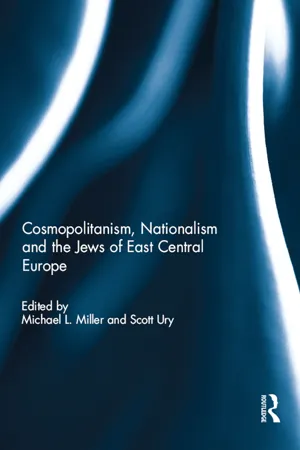
Cosmopolitanism, Nationalism and the Jews of East Central Europe
- 224 pages
- English
- ePUB (mobile friendly)
- Available on iOS & Android
Cosmopolitanism, Nationalism and the Jews of East Central Europe
About this book
Since ancient times, Jews have had a long and tangled relationship to cosmopolitanism. Torn between a longstanding commitment to other Jews and the pressure to integrate into various host societies, many Jews have sought a third, seemingly neutral option, that of becoming citizens of the world: cosmopolitans. Few regions witnessed such intense debates on these questions as the lands of East Central Europe as they entered the modern era. From Berlin to Moscow and from Vilna to Bucharest, the Jews of East Central Europe were repeatedly torn between people, nation and the world. While many Jews and individuals of Jewish descent embraced cosmopolitan ideologies and movements across the span of the nineteenth century, such appeals to transcend the nation became increasingly suspect with the rise of integral nationalism. In Germany, Poland, Russia and other lands, Jews and other supporters of cosmopolitan movements were marginalized during the late nineteenth and early twentieth centuries. Although such sentiments reached their peak during the Second World War, anti-cosmopolitan propaganda continued throughout the Cold War when it often became an integral part of anti-Jewish campaigns in the Soviet Union, Czechoslovakia, Poland and Romania. Even after the end of the Cold War, the connection between Jews and cosmopolitanism continues to befuddle ideologues, cultural leaders and politicians in Europe, North America and Israel.
The fourteen chapters amassed in this volume address these and other questions including: What lies at the roots of the longstanding connection between Jews and cosmopolitanism? How has this relationship changed over time? What can different cultural, economic and political developments teach us about the ongoing attraction and tension between Jews and cosmopolitanism? And, what can these test cases tell us about the future of Jews and cosmopolitanism in the twenty-first century?
This book was originally published as a special issue of the European Review of History.
Frequently asked questions
- Essential is ideal for learners and professionals who enjoy exploring a wide range of subjects. Access the Essential Library with 800,000+ trusted titles and best-sellers across business, personal growth, and the humanities. Includes unlimited reading time and Standard Read Aloud voice.
- Complete: Perfect for advanced learners and researchers needing full, unrestricted access. Unlock 1.4M+ books across hundreds of subjects, including academic and specialized titles. The Complete Plan also includes advanced features like Premium Read Aloud and Research Assistant.
Please note we cannot support devices running on iOS 13 and Android 7 or earlier. Learn more about using the app.
Information
Table of contents
- Cover
- Half Title
- Title Page
- Copyright Page
- Table of Contents
- Citation Information
- Notes on Contributors
- 1. Cosmopolitanism: the end of Jewishness?
- 2. Sabbatian Charlatans: the first Jewish cosmopolitans
- 3. From liberal nationalism to cosmopolitan patriotism: Simon Deutsch and 1848ers in exile
- 4. Circulation and representation: Jews, department stores and cosmopolitan consumption in Germany, c.1880s-1930s
- 5. Jan Gottlieb Bloch: Polish cosmopolitism versus Jewish universalism
- 6. Jews as cosmopolitans, foreigners, revolutionaries. Three images of the Jew in Polish and Russian nationalist ideology at the end of the nineteenth and early twentieth centuries
- 7. ‘Russia’s battle against the foreign’: the anti-cosmopolitanism paradigm in Russian and Soviet ideology
- 8. The 1919 Central European revolutions and the Judeo-Bolshevik myth
- 9. The unexpected cosmopolitans - Romania’s Jewry facing the Communist system
- 10. Imagining ‘the Jews’ in Stalinist Poland: nationalists or cosmopolites?
- 11. A jagged circle: from ethnicity to internationalism to cosmopolitanism – and back
- 12. The other story: Israeli historians and Jewish ‘universalism’
- Index